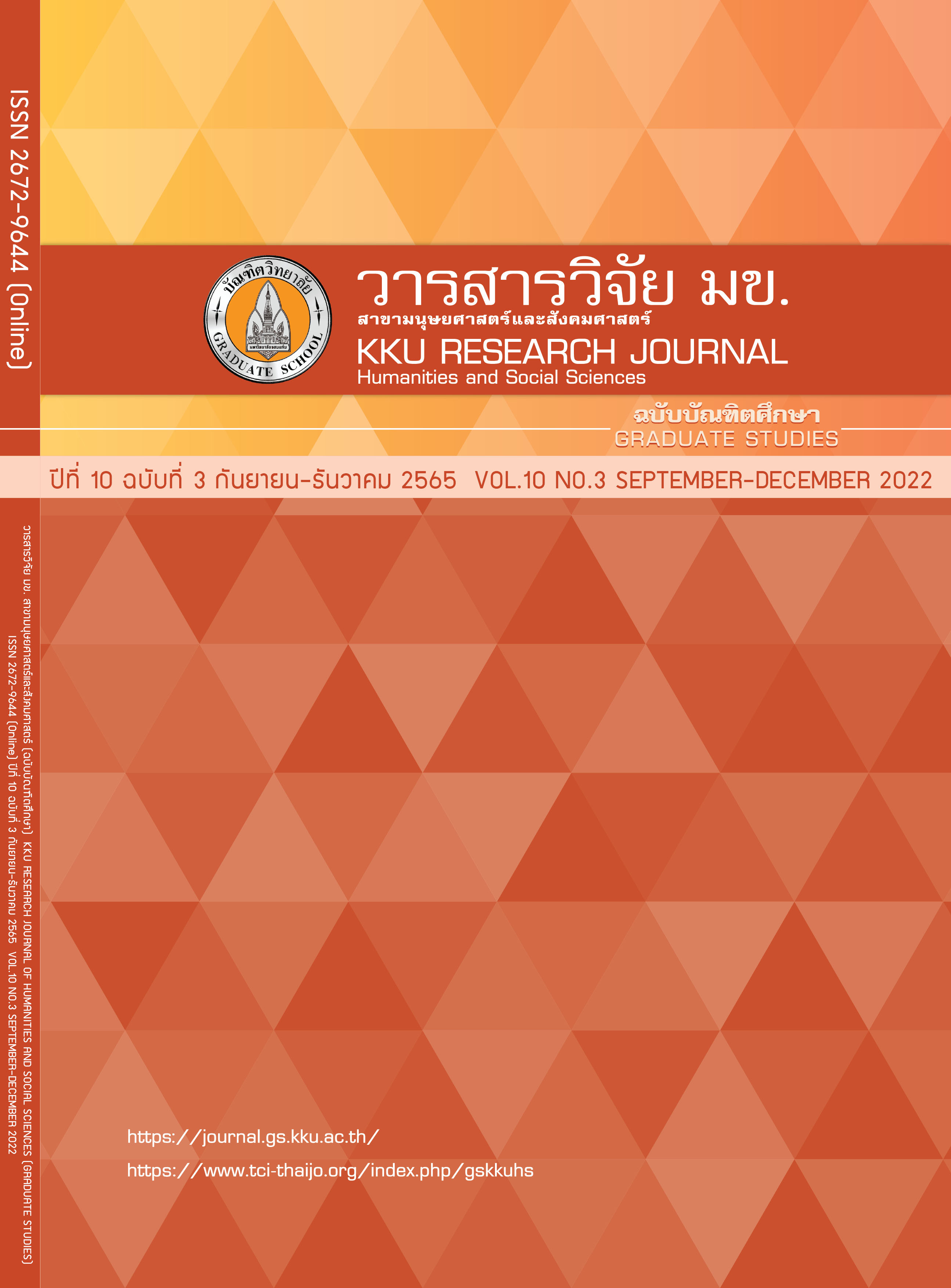Exploring the Roles of the L2 Motivational Self System in the English Learning Achievement of Thai High School Learners
Keywords:
L2 Motivational Self System, Learning Achievement, EnglishAbstract
This research investigated the roles of the Second Language (L2) Motivational Self System (L2MSS) in the English learning achievement of Thai high school learners and the success in learning English of Thai high school students. By adapting the frameworks of the L2 MSS, which consisted of the ideal L2 self, ought-to L2 self, and L2 learning experience, this research aimed to explore perceptions to understand the learners' motivation that can impact English learning achievement. The sample included 120 twelfth-grade students selected through random sampling from four typical English as a Foreign Language (EFL) classes at a local secondary school. Data were collected through a questionnaire and in-depth interviews, following a mixed-method study format. The questionnaire aimed to identify various characteristics of Thai EFL learners. Meanwhile, ten participants were invited for interviews to ascertain the perceptions of Thai high school learners regarding L2 MSS in their English learning achievements. The findings from the questionnaire indicated that the ideal L2 self was the most important factor, followed by the L2 learning experience, while the ought-to L2 self was the least influential. Moreover, the interview results suggested that both high and low achievers appeared to share common goals in learning English. Therefore, this research provides teachers with insights into creating more visionary, motivational approaches in the language classroom, as the ideal L2 self becomes the driving force for performance.
References
Crookes GV, Ziegler N. Critical language pedagogy and Task-Based Language Teaching: Reciprocal relationship and mutual benefit. Education Sciences. 2021; 11(6): 254.
Ushioda E, Dörnyei Z. Beyond global English: Motivation to learn languages in a multicultural world: Introduction to the special issue. The Modern Language Journal. 2017; 101(3): 451-4.
Rahardjo A, Pertiwi S. Learning motivation and students’ achievement in learning English. JELITA. 2020; 1(2): 56-64.
Fachraini S. An Analysis of Students’ Motivation in Studying English. Getsempena English Education Journal. 2017; 4(1): 47-57.
Wulf G, Lewthwaite R. Optimizing performance through intrinsic motivation and attention for learning: The OPTIMAL theory of motor learning. Psychonomic bulletin & review. 2016; 23(5): 1382-414.
Dembo MH, Seli H. Motivation and learning strategies for college success: A focus on self-regulated learning. [n.p.]: Routledge; 2016.
Teng B, Sinwongsuwat K. Teaching and Learning English in Thailand and the Integration of Conversation Analysis (CA) into the Classroom. English Language Teaching. 2015; 8(3): 13-23.
Kaur A, Young D, Kirkpatrick R. English education policy in Thailand: Why the poor results? English language education policy in Asia. [n.p.]: Springer; 2016. p. 345-61.
Baker W, Jarunthawatchai W. English language policy in Thailand. European journal of language policy. 2017; 9(1): 27-45.
Nomnian S, Arphattananon T. A qualitative study on factors influencing achievement of English language teaching and learning in Thai government secondary schools. Asian EFL Journal. 2018; 20(6): 207-33.
Tang KN. Challenges and Importance of Teaching English as a Medium of Instruction in Thailand International College. Journal of English as an International Language. 2020; 15(2): 97-118.
Dörnyei Z, Ushioda E. Motivation, language identity and the L2 self: Multilingual Matters; 2009.
Dornyei Z, Ryan S. The psychology of the language learner revisited. [n.p.]: Routledge; 2015.
Taguchi T, Magid M, Papi M. The L2 motivational self system among Japanese, Chinese and Iranian learners of English: A comparative study. Motivation, language identity and the L2 self. 2009; 36: 66-97.
Kormos J, Csizér K. Age‐related differences in the motivation of learning English as a foreign language: Attitudes, selves, and motivated learning behavior. Language learning. 2008; 58(2): 327-55.
2007 PMPNRNT. tentang Standar Kepala Sekolah/Madrasah. 2007.
Li Q. Differences in the motivation of Chinese learners of English in a foreign and second language context. System. 2014; 42: 451-61.
Kim T-Y, Kim Y, Kim J-Y. Structural relationship between L2 learning (de) motivation, resilience, and L2 proficiency among Korean college students. The Asia-Pacific Education Researcher. 2017; 26(6): 397-406.
Cheng H-F, Dörnyei Z. The use of motivational strategies in language instruction: The case of EFL teaching in Taiwan. International Journal of Innovation in Language Learning and Teaching. 2007; 1(1): 153-74.
Ivankova NV, Creswell JW, Stick SL. Using mixed-methods sequential explanatory design: From theory to practice. Field methods. 2006; 18(1): 3-20.
Jong YO, Jung CK. The Development of Interview Techniques in Language Studies: Facilitating the Researchers' Views on Interactive Encounters. English Language Teaching. 2015; 8(7): 30-9.
Dörnyei Z. Attitudes, orientations, and motivations in language learning: Advances in theory, research, and applications. Language learning. 2003; 53(S1): 3-32.
Chung I-F. Crammed to learn English: What are learners’ motivation and approach? The Asia-Pacific Education Researcher. 2013; 22(4): 585-92.
Lamb M. A self system perspective on young adolescents’ motivation to learn English in urban and rural settings. Language learning. 2012; 62(4): 997-1023.
Dörnyei Z, Chan L. Motivation and vision: An analysis of future L2 self images, sensory styles, and imagery capacity across two target languages. Language learning. 2013; 63(3): 437-62.
Moskovsky C, Assulaimani T, Racheva S, Harkins J. The L2 motivational self system and L2 achievement: A study of Saudi EFL learners. The Modern Language Journal. 2016; 100(3): 641-54.
MacIntyre PD, MacKinnon SP, Clément R. Toward the development of a scale to assess possible selves as a source of language learning motivation. Motivation, language identity and the L2 self Bristol: Multilingual Matters. 2009: 193-214.
Papi M, Temouri Y. Dynamics of self and motivation: a cross-sectional study of the EFL context in Iran. International Journal of Applied Linguistics. 2013; 2(3): 288-309.
Downloads
Published
How to Cite
Issue
Section
License

This work is licensed under a Creative Commons Attribution-NonCommercial-NoDerivatives 4.0 International License.




